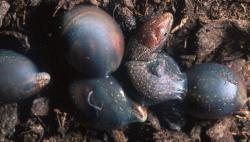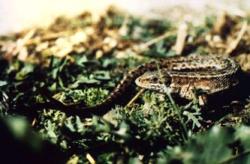Lizards have personalities too, study shows
13:35 08 November 2006
NewScientist.com news service
Roxanne Khamsi

The lizards were monitored from birth (Image: Jean-François Le Galliard)

The researchers captured pregnant females for their study (Image: Jean-François Le Galliard)
They may be cold-blooded, but some lizards have warm personalities and like to socialise, a new study shows.
A behavioural study reveals that lizards have different social skills: some are naturally inclined to join large groups while others eschew company altogether. The discovery of reptilian personality types could help ecologists better understand and model animal population dynamics, say the researchers involved.
Scientists define "personality differences" as consistent behavioural differences between individuals across time and contexts. But there is a need for more research on these differences in wild animals, says Julien Cote of the Pierre and Marie Curie University in Paris, France. "Psychologists have explored the considerable range of non-human personalities like sociability, but mostly on domesticated animals," he says.
Scent of another
Cote and colleagues captured wild pregnant common lizards (Lacerta vivipara), and as soon as the offspring were born they were exposed to the scent of other lizards, to test their reactions. Over the next year the team monitored the newly born creatures to see how much time each spent in different areas of their enclosure.
Lizards that showed an aversion to other scents at an early age were more likely to flee highly populated areas of the enclosure, Cote's team found. These lizards were described as "asocial". In contrast, those that had been initially attracted to other scents often left sparsely populated areas of the enclosure to seek out areas of higher population density.
Understanding these personality differences in wild animals could give ecologists a more nuanced view of population dynamics, Cote says. "When studying and modelling how populations function, it is necessary to consider different kinds of individuals reacting differently to the environment rather than a unique behavioural response for all individuals."
Other experts agree that personality types could help explain why some animals might be more reluctant to leave a group and explore new turf. "If you have a personality by definition you are constrained," says ecologist Jason Jones of Vassar College in Poughkeepsie, New York, US.
Journal reference: Proceedings of the Royal Society B (DOI: 10.1098/rspb.2006.3734)
Related Articles
- Extinct lizard flew on delta wing like a fighter jet
- http://www.newscientist.com/article.ns?id=mg19025453.400
- 04 April 2006
- Lizards' poisonous secret is revealed
- http://www.newscientist.com/article.ns?id=dn8331
- 16 November 2005
- Found: the flying lizards’ missing lift
- http://www.newscientist.com/article.ns?id=dn8133
- 12 October 2005
Weblinks
- Proceedings of the Royal Society B
- http://www.pubs.royalsoc.ac.uk/index.cfm?page=1087
- Pierre and Marie Curie University
- http://www.upmc.fr/FR/info/00
Return to article
0 comentarios